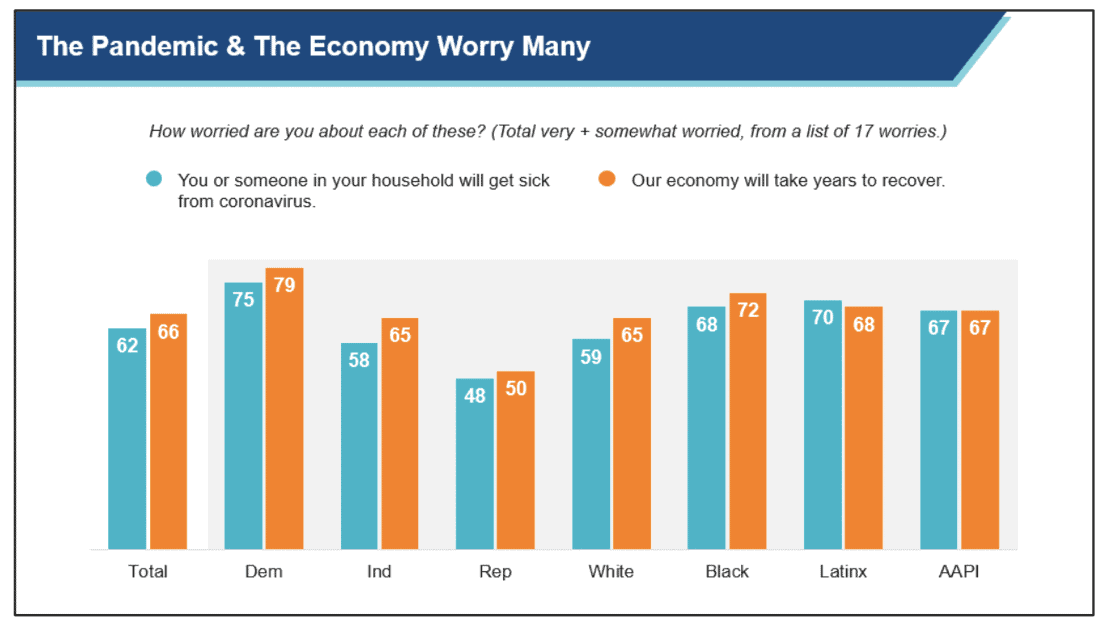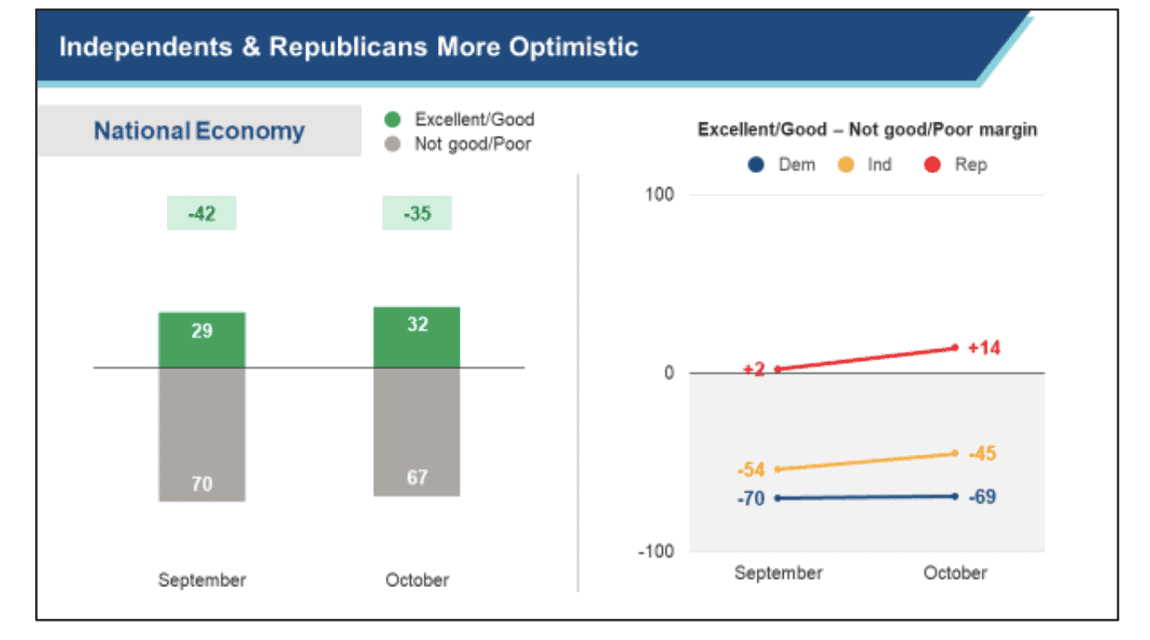Voters of Color Taking More Actions to Save, Generate Income, According to Omidyar Network’s Economic Tracking Survey
Washington, DC – American voters overall—and across party lines—support a wide range of progressive policies for the federal government to address the dual crises of the pandemic and economic recession, according to Omidyar Network’s Economic Tracking Survey. The results of October’s survey build on September’s inaugural survey, in which majorities prioritized a range of broad government approaches to the pandemic and economic recovery. And as in September, many Americans—particularly Black and Latinx voters—are feeling the economic pressures of the pandemic acutely.
“By monitoring changes in voters’ economic experiences and how they are impacted during the pandemic, we can see how deep structural and systemic inequities have led to markedly higher economic pressures and worries for Black and Latinx communities,” said Beth Kanter, Chief Advocacy & Strategic Communications Officer of Omidyar Network. “Just as importantly, we have also been able to determine the types of solutions that can unite a broad swath of American voters.”
The most popular remedy, favored by 82% of voters, would make COVID testing free and readily available. Other popular proposals would provide direct relief to those who need it, such as stimulus checks (77% favor), foreclosure relief (76% favor) and expanded unemployment insurance benefits (75% favor).
These same proposals, which often prompt partisan battles among policymakers, have broad bipartisan support among voters, with stimulus checks favored by 85% of Democrats, 72% of Independents and 73% of Republicans; foreclosure relief favored by 87% of Democrats, 69% of Independents and 70% of Republicans; and expanded unemployment insurance favored by 85% of Democrats, 70% of Independents and 68% of Republicans.
“Support like this suggests these policies need not be partisan battles, but instead can be areas of consensus,” said Margie Omero, principal at GBAO, which conducted the survey.

The majority of voters worry about the dual crises of someone in their household getting coronavirus and the economy “taking years to recover” (62% and 66% respectively). Majorities or near-majorities across nearly every group surveyed share these worries, including Republicans, conservative Republicans, Trump voters, those who think the economy is doing “excellent,” and those who have felt no job or wage loss from COVID in their household.
While many Americans continue to face economic pressure or worries about the future, Omidyar Network’s Economic Tracking Survey found that Black and Latinx voters are still experiencing the pandemic more acutely than White voters:

- Black and Latinx voters are more likely to have someone in their household who has had COVID (11% and 17% respectively, compared to 7% overall), and more likely to say their household has experienced job, hours, or wage loss (52% and 58% respectively, compared to 38% overall).
- Black and Latinx voters are also more likely to have taken action to save or generate income. Over half have cut household spending (54% Black, 51% Latinx), and sizeable numbers have had trouble paying bills (39%, 37%), have applied for government assistance or (32%, 28%) or borrowed money (30%, 27%).
- White voters and voters of color share many worries about the future, but voters of color are more worried about contracting the coronavirus, getting exposed to the virus at work, affording the basics, personal debt, and the quality of their children’s education than White voters.
As compared to the Omidyar Network’s Economic Tracking Survey in September, there was a small rise in the number of respondents reporting that the U.S. economy is doing “excellent” or “good” (32% vs. 29% in September), with a similar three-point gain in positive ratings of their state’s economy (33% vs. 30% in September).

But there is little change in voters’ optimism for what comes next: only 26% think their own situation will improve in the next six months, as compared to 28% in September, 19% think it will worsen (18% in September), and half predict it will stay the same (50% vs. 48% in September).
With less than a week before Election Day, the survey also found that Vice President Joe Biden has a double-digit lead over President Trump (53% vs. 40%) overall, with almost nine-in-ten Black voters supporting Biden (86%) and about two-thirds of Latinx and AAPI voters (68% and 65%, respectively) expressing support.
Omidyar Network’s October Economic Tracking Survey was designed, conducted and analyzed by GBAO. The poll was conducted via online survey from October 15 – 19, 2020. One thousand four hundred and fifty (1,450) interviews were completed with registered voters. Results include oversamples of voters of color for a total of 275 Black voters, 238 Latinx voters, and 195 AAPI voters. The sample is weighted to a sample size of 1,000 and is representative of registered voters nationally along lines of gender, region, age, race/ethnicity, education, and other characteristics. With a relatively smaller sample size among AAPI voters, results for this community cannot be fully representative of the diversity of the AAPI electorate.
Full toplines for October’s poll can be found here.
Omidyar Network believes an updated capitalism must place individuals, community, and societal well-being at the center of our economy, and has offered an alternative vision for an economy. Read more about Our Call to Reimagine Capitalism in America HERE.
###
Established by philanthropists Pam and Pierre Omidyar, Omidyar Network is a social change venture that has committed more than $1 billion to innovative for-profit companies and nonprofit organizations since 2004. Omidyar Network works to reimagine critical systems and the ideas that govern them, and to build more inclusive and equitable societies in which individuals have the social, economic, and democratic power to thrive.
